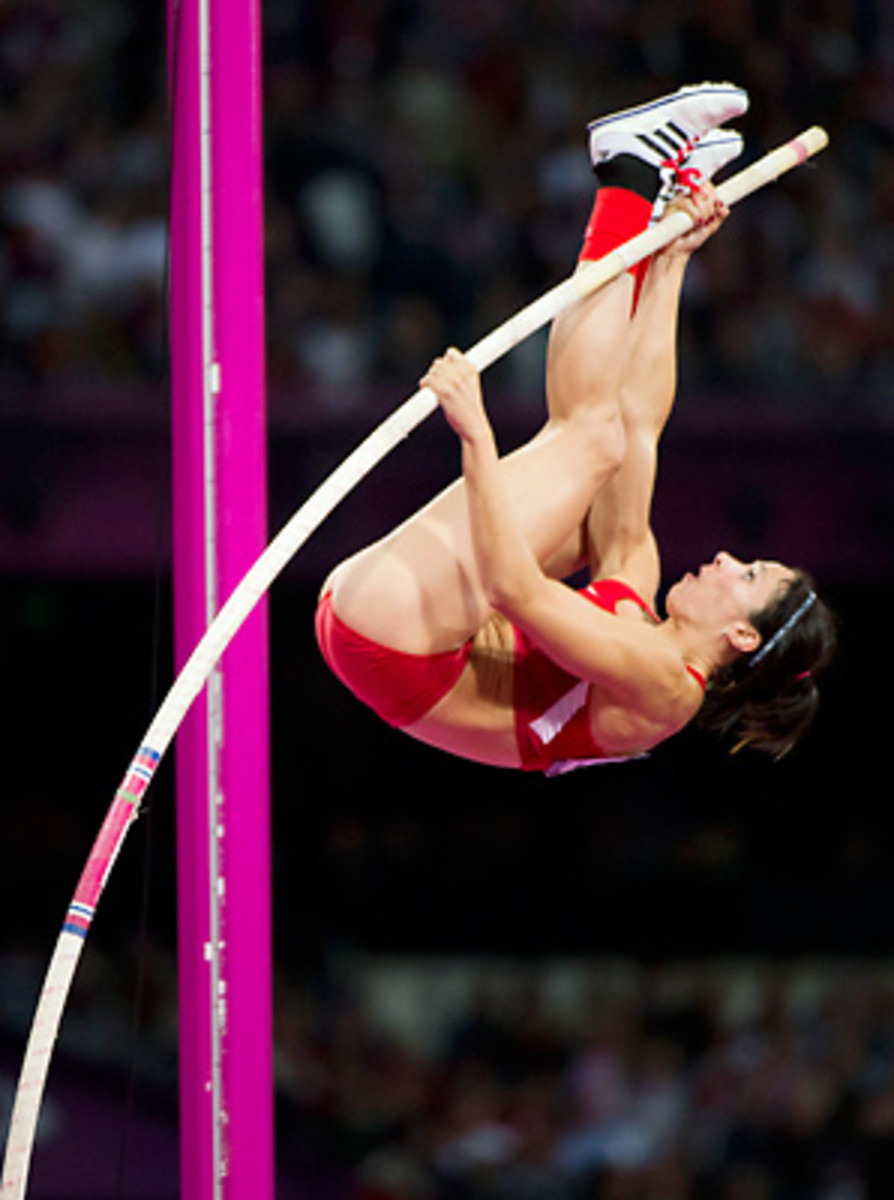
Suhr vaults to unexpected gold
LONDON -- Jenn Suhr has cried before competing twice in her eight-year career, according to her coach and husband, Rick Suhr.
The first was Saturday, when she qualified for the Olympic pole vault final with one jump. The second came Monday at 3:30 p.m. London time, as Rick dropped her off for a shuttle to Olympic Stadium, the last time they'd embrace for six hours.
"She was really nervous," recounted Rick, welling up himself, standing in the middle of a row at Olympic Stadium at 10 p.m.. "She was really upset."
The last thing Rick says to Jenn before every competition is, "I'll see you on the beach," taken from Rick's favorite film, "Saving Private Ryan." They're both World War II history buffs.
Rick added one more line Monday afternoon, something he'd never before said to Jenn.
"You're going to win this."
She did. Suhr became the second U.S. woman to win the Olympic pole vault, joining the event's 2000 debut champion, Stacy Dragila. She did it by ousting the two-time defending Olympic champion, world-record holder and Russian track and field diva Yelena Isinbayeva. Isinbayeva was trying to become the first woman to win an individual Olympic track and field event three times. Denied, the diva settled for bronze and said afterward she wouldn't have competed in her fourth Games had she'd known that would be the outcome. Cuban Yarisley Silva was the surprise silver medalist.
Suhr, like Isinbayeva, is 30 years old. But Suhr didn't start pole vaulting until 2004, the year Isinbayeva won her first Olympic title and set the second of her 17 world records. Pole vaulters are known for breaking records one centimeter at a time, coined by the great Sergey Bubka.
In 2004, Rick discovered Jenn Stuczynski on the Roberts Wesleyan basketball team (she averaged 24 points and six rebounds per game and led the Raiders to the NAIA title game) and thought she had the intensity and skills to pole vault. They were married in 2010.
The obvious story from Suhr's victory -- won at 4.75 meters in terrible conditions, temperatures in the 60s with a bag-blowing 10-to-15 mile-per-hour shifting breeze -- was redemption. She was second to Isinbayeva in Beijing, back when she was a Stuczynski, and spent the last four years chasing down women's track and field's most dominant athlete this century.
Suhr endured injuries, like many Olympians. As recently as May, she tore her quadriceps. She was also diagnosed with celiac disease last year, a condition caused by eating foods with gluten that causes physical weakness, according to WebMD.
Still, Suhr, in a sparkling silver headband, entered the Olympic final with the world's best clearance this year (4.83 meters). Isinbayeva (confidently wearing gold earrings, a gold necklace and gold spikes) may have been the favorite, but she was no longer invincible. At a meet in Monaco two weeks ago, she didn't clear a height.
"I know when she's in the field," Suhr said. "I just don't know how high she can jump. You have to prepare for anything."
Isinbayeva knocked the bar off on her opening jump for the first time at an Olympics since she no-heighted as an 18-year-old in Sydney. Isinbayeva, who trains in Monaco where it doesn't dip below a monthly average of 55 degrees, couldn't clear anything better than 4.70 meters, more than a foot lower than her world record at the Beijing Olympics.
She laid down in between jumps under a London 2012 blanket tent, wearing a jacket and cap and, for the misty portion of the night, a poncho.
Suhr trains in a western New York Quonset hut dubbed "Rocky's meat locker" that can get as cold as 30 degrees. She paced on this windbreaker night in Team USA garb from head to toe.
"You know how to jump in this," Rick told her. "You can dig deep. You can jump in this."
Suhr controlled the competition from the start, and though she finally missed once at 4.75 meters, cleared on her second attempt and won gold when both she and Silva couldn't clear 4.80. Silva's early miss at 4.45 -- before the big guns entered the competition -- broke the tie in Suhr's favor.
Once it was over, Suhr and Isinbayeva stayed close on their victory lap and exchanged words.
"She said I deserve it," Suhr said.
Six hours after the shuttle sendoff, she embraced Rick again. This time, Rick began crying. As was Suhr.
"We did it," he said.
"We did it," she replied.





